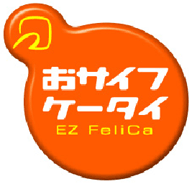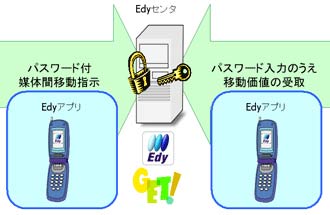KDDI Announces EZ-Felica Wallet Cell Phone Service
 Fresh off the news wire [Jpn], KDDI just announced they are ready to roll out wallet-enabled handsets for their new “EZ-Felica” campaign scheduled to hit the Ginza sometime this September. According to the company, they are street-testing the new BREW-based application program which will offer digital cash together with a range of membership services including loyalty points for registered users. But wait.. that’s not all! KDDI also announced that from January 2006, the company will enable customers to use “Mobility Suica” in partnership with East Japan Railway Company (JR) as well. It seems like only yesterday (actually, December 2003) we reported “KDDI Joins FeliCa Bandwagon”.
Fresh off the news wire [Jpn], KDDI just announced they are ready to roll out wallet-enabled handsets for their new “EZ-Felica” campaign scheduled to hit the Ginza sometime this September. According to the company, they are street-testing the new BREW-based application program which will offer digital cash together with a range of membership services including loyalty points for registered users. But wait.. that’s not all! KDDI also announced that from January 2006, the company will enable customers to use “Mobility Suica” in partnership with East Japan Railway Company (JR) as well. It seems like only yesterday (actually, December 2003) we reported “KDDI Joins FeliCa Bandwagon”.


 bitWallet Ltd., the company that manages digital cash service Edy (Euro-Dollar-Yen), just announced the company will launch a new service called “Edy to Edy” on 20 July. According to the company (rough translation), “[If] the Edy cash value can be sent not only by the Edy number, [but also by] the mail address or the telephone number, it is thought that payments for net auctions, personal gifts or adjustments and congratulations can be used more conveniently.” A minimum transfer fee of 50 yen will be charged for each transaction plus (Aha!) the standard 5% consumption tax; the maximum amount per transfer is limited to 50,000 yen (about US$500). P2P cash transactions between individual handsets has, until now, not been possible in Japan.
bitWallet Ltd., the company that manages digital cash service Edy (Euro-Dollar-Yen), just announced the company will launch a new service called “Edy to Edy” on 20 July. According to the company (rough translation), “[If] the Edy cash value can be sent not only by the Edy number, [but also by] the mail address or the telephone number, it is thought that payments for net auctions, personal gifts or adjustments and congratulations can be used more conveniently.” A minimum transfer fee of 50 yen will be charged for each transaction plus (Aha!) the standard 5% consumption tax; the maximum amount per transfer is limited to 50,000 yen (about US$500). P2P cash transactions between individual handsets has, until now, not been possible in Japan.